Unit6 Seasonal changes 第2课时 语法知识及拓展 课件(共27张PPT)
文档属性
| 名称 | Unit6 Seasonal changes 第2课时 语法知识及拓展 课件(共27张PPT) |  | |
| 格式 | pptx | ||
| 文件大小 | 1.1MB | ||
| 资源类型 | 试卷 | ||
| 版本资源 | 牛津上海版(试用本) | ||
| 科目 | 英语 | ||
| 更新时间 | 2022-03-09 17:34:06 | ||
图片预览

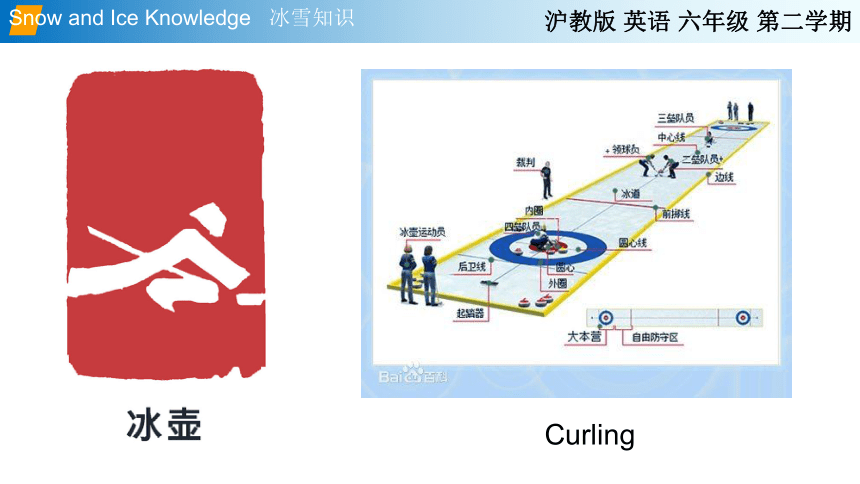
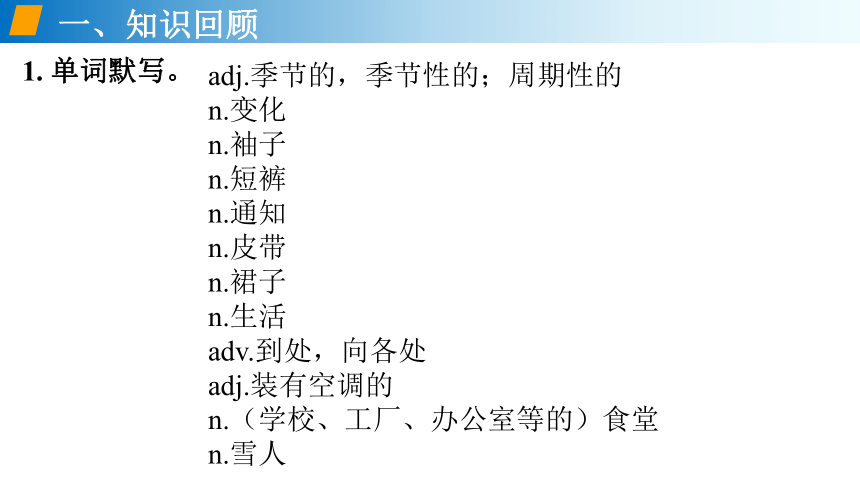
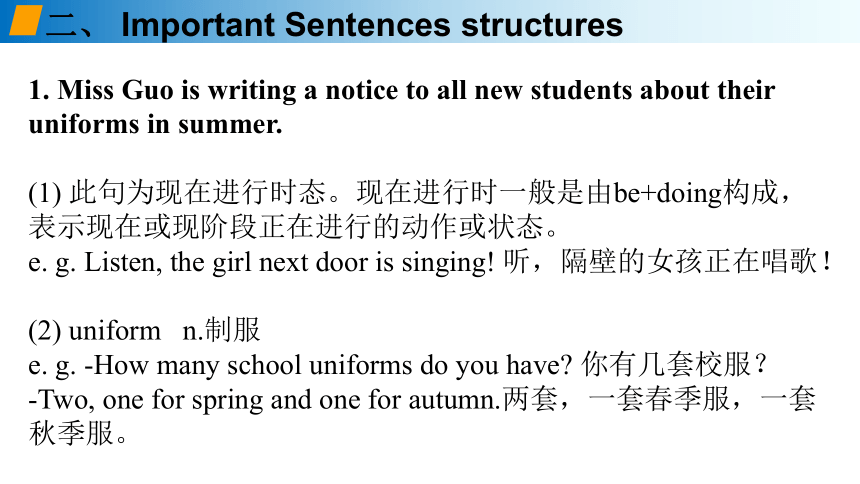

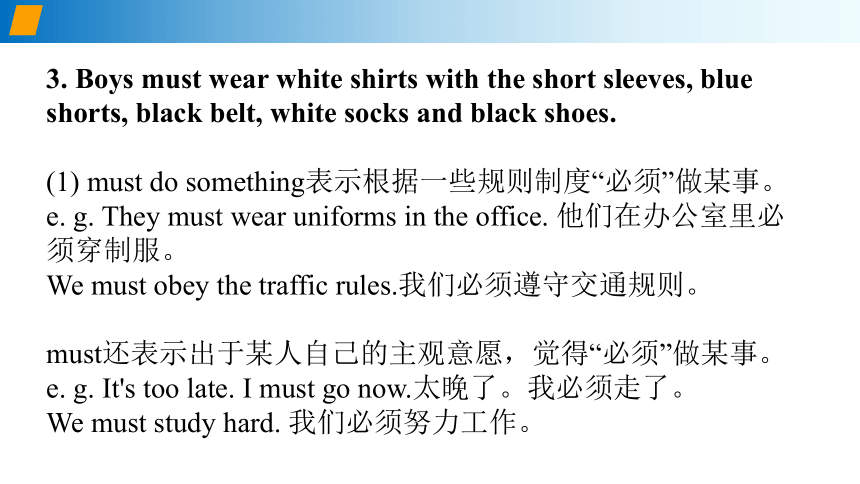
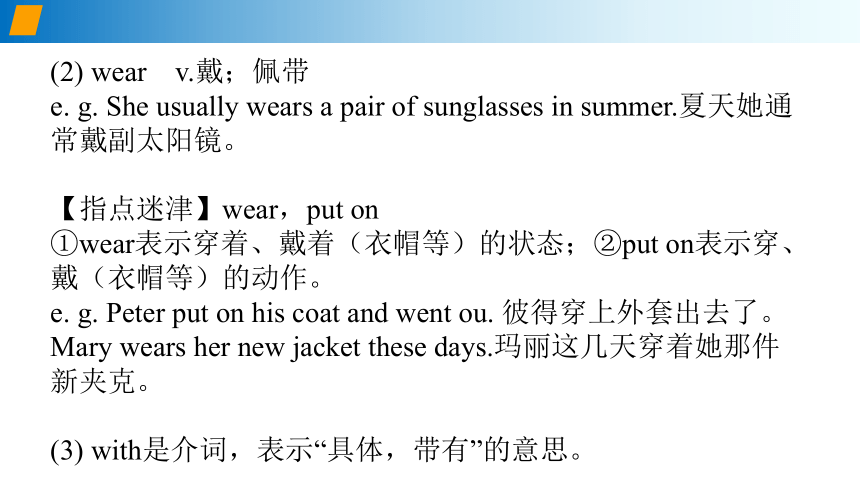


文档简介
(共27张PPT)
All things in their being are good for something.
天生我材必有用。
沪教版 英语 六年级 第二学期
Lead in— 学海拾贝
既然这个事物或人存在,它肯定有自己的价值。
In other words, Since this thing or person exists in this world, it or he must have some value.
Snow and Ice Knowledge 冰雪知识
Curling
沪教版 英语 六年级 第二学期
adj.季节的,季节性的;周期性的
n.变化
n.袖子
n.短裤
n.通知
n.皮带
n.裙子
n.生活
adv.到处,向各处
adj.装有空调的
n.(学校、工厂、办公室等的)食堂
n.雪人
1. 单词默写。
一、知识回顾
二、 Important Sentences structures
1. Miss Guo is writing a notice to all new students about their uniforms in summer.
(1) 此句为现在进行时态。现在进行时一般是由be+doing构成,表示现在或现阶段正在进行的动作或状态。
e. g. Listen, the girl next door is singing! 听,隔壁的女孩正在唱歌!
(2) uniform n.制服
e. g. -How many school uniforms do you have 你有几套校服?
-Two, one for spring and one for autumn.两套,一套春季服,一套秋季服。
2. All students must wear summer uniforms in September, early October, late April, May and June.
in early October 在十月初 in late April 在四月下旬
在这两个词组中,early,late都是形容词,early意为“早;初;初期的”,late意为“晚;末期的;近末尾的”。
【知识拓展】early和late还可以作副词。
e. g. My mum gets up early every day. 我妈妈每天早起。
Don't go to bed too late. You need more sleep.不要太晚睡觉,你需要更多的睡眠。
3. Boys must wear white shirts with the short sleeves, blue shorts, black belt, white socks and black shoes.
(1) must do something表示根据一些规则制度“必须”做某事。
e. g. They must wear uniforms in the office. 他们在办公室里必须穿制服。
We must obey the traffic rules.我们必须遵守交通规则。
must还表示出于某人自己的主观意愿,觉得“必须”做某事。
e. g. It's too late. I must go now.太晚了。我必须走了。
We must study hard. 我们必须努力工作。
(2) wear v.戴;佩带
e. g. She usually wears a pair of sunglasses in summer.夏天她通常戴副太阳镜。
【指点迷津】wear,put on
①wear表示穿着、戴着(衣帽等)的状态;②put on表示穿、戴(衣帽等)的动作。
e. g. Peter put on his coat and went ou. 彼得穿上外套出去了。
Mary wears her new jacket these days.玛丽这几天穿着她那件新夹克。
(3) with是介词,表示“具体,带有”的意思。
4. Many flowers grow in the garden.
此句为一般现在时态,表示普遍真理。由于是众所周知的客观事实,所以一般不用时间状语。
e. g. Light goes faster than sound. 光比声音的传播速度快。
The earth runs around the sun. 地球围绕太阳转。
【知识拓展】
(1)一般现在时还可表示经常发生的动作或存在的状态,常和always,usually,often,sometimes,every day等时间状语连用。
e. g. I often wash clothes.我经常洗衣服。
She seldom goes to the cinema.她很少去看电影。
(2)一般现在时还可表示预先计划或安排的肯定要发生的动作。主要用于come,go,start,begin,leave等瞬间动词,句中常有表示将来时间的状语。
e. g. He comes home in a minute.他一会儿就要回家。
I return it next Sunday.下星期天我将归还它。
5. Not many students like playing in the playground because it is very hot.
because意为“因为”,是从属连词,引导原因状语从句。
e. g. She was late, because she met a traffic accident. 因为遭到车祸,所以她迟到了。
【知识拓展】
(1) because常用来回答why引导的问句。
e. g. -Why are you not come here 你为什么没有来这儿?
-Because I have something else to do.因为我有其它的事情做。
(2) 汉语中我们经常说因为……所以……但在英文中有了because,就不能再用so。
Because I don't like you, so I don't want to see you.(X)
6. Many students like having ice cream and soft drinks after lunch.
(1) and表示“和”,“而且”的意思,用来连接对等关系的词、短语或句子。
e. g. Students sang and danced at the party. 学生在派对上又唱又跳。
(2) many为形容词,意为“许多的”,用于并且只修饰可数名词。
e. g. Many (of the)foreign guests took part in the May Day celebrations. 很多外宾参加了“五一”庆祝活动。
Rewrite the sentence as required.
1. Students must wear uniforms at school. (改成一般疑问句)
____________students uniform at school
2. Bob has already finished his homework. (改成否定句)
Bob finish his homework .
3. Many students like swimming because it is too hot. (对划线部分提问)
____________ ____________ many students like swimming
4. Boys and girls must wear uniforms every day. (保持句意不变)
Boys and girls____________ ____________ wear uniforms every day.
5. Tom is tall. Tim is taller. (用 than 连成一句)
Tim is____________ ____________ Tom.
【随堂小练】
【Keys】1. Must, wear 2. hasn't yet 3. Why do 4. have to 5. taller than
If I could, I would, but I can’t, so I shan’t.
使用了那些情态动词?
如果我能做的话,我会做的.但我不会做,所以我不会去做的
三、语法讲解
情态动词的特征
1)本身有一定的词义;
2)只能和其他动词原形构成谓语;
3)没有人称,数的变化;
Every one must eat every day in order to live!
表肯定推测
The bag must be Anne's because it has her name on it.
must表示主观义务,意为“应该,“必须”
I must go home early.
mustn't表示“不准”, “不允许”,“禁止”
You mustn’t break the rules/laws.
只有现在时一种形式(在宾语从句中可以表示过去)
He said she must go with me.
must的使用
1
A. shall B. may C. must D. can
According to the school rules, they_______ wear school uniforms at the school.
2
3
-Must I stay at home, Mum
-No, you_________.
A. needn't B. mustn't
C. don't D. may not
-Who is the man over there Is it Mr. Li
-No, it______ be him. Mr. Li has gone to America.
A. mustn't B. may not
C. can't D. needn't
I have to keep my room clean every day.
Now there’s no bus here, so we had to walk home.
Peter has to finish his homework today.
He didn’t have to cancel the plan.
have to
“不得不”
“必须”
有人称,数及时态的变化
don’t have to
=needn’t
Would all my friends come to my party
Rule 2
Rule 1
Rule 3
表示意志,愿望和决心,是will的过去式;
-Would you like to do sth…
Would like/ love to do sth.
Would you mind doing...
Would you please do...
would rather (not) do...
would rather… than do…
用于第二人称的疑问句中,表征求意见或提出请求
would
的
使
用
1. Plants and flowers ___water and sun when they start growing.
A. need to B. don't need C. needn't D. need
2. You have already tried your best, so you ______ worry too much about the exams.
A. can't B. needn't C. mustn't D. shouldn't
3. Only you ______ do such a thing, I'm sure, and nobody else has such an ability.
A. must B. should C. may D. can
4. —________ I watch TV now, Mom
—No. It’s too late, and you ______ go to bed.
A. May; have to B. Will; should
C. Can; will D. Must; need
5 --Mum, will you buy me the new iPad after the High School Entrance Examination
-- I’m afraid I _______, dear. We are short of money now.
A. can’t B. mustn’t
C. shouldn’t D. needn’t
( ) 1. Kelly was born September in Shanghai.
A. on B. in C. at D. by
( ) 2. university student over there is my cousin.
A. A B. An C. The D. /
( ) 3. All the passengers get off the train at the terminal station.
A. can B. may C. shouldn't D. must
( ) 4. Judy in Los Angeles for six years.
A. lived B. has come C. came D. has lived
( ) 5. My father knows only English. He can't talk with foreigners fluently.
A. a little B. a few C. much D. a lot
( ) 6. foreigners will come to China to watch the Olympic Games this year.
A. Thousand of B. Ten thousand of
C. Thousands of D. Ten thousands of
【随堂小练】
( )7. —Would you like the film with me tonight
—No, thanks. I'd rather at home.
A. see, stay B. to see, to stay
C. to see, stay D. see, to stay
( ) 8. —Have you checked your passport yet — .
A. Yes, I did B. No, I don't
C. I have checked D. Not yet
( ) 9. Little Tom is good at tennis.
A. play B. to play C. played D. playing
( ) 10. He made mistakes than Bob in the test.
A. a little B. less C. fewer D. a few
( ) 11. useful advice my teacher has given us!
A. How B. What C. What a D. What an
( ) 12. Qu Yuan was always sad the new emperor didn't take his advice.
A. but B. so C. because D. and
1.B 2.C 3.D 4.D 5. A 6. C 7. C 8. D 9. D 10. C 11. B 12. C
Find the words which have the same meaning to the underlined words.
A. well-known B. by air C. depart for
D. finally E. refused F. plenty of
( )1. When will this plane leave for Los Angeles
( ) 2. Hangzhou is famous for the West Lake.
( )3. He was often late for work and at last the boss dismissed him.
( )4. I have told him many times not to stay up too late, but he didn' t take my advice.
( )5. Are you going to Bangkok by plane
1. C 2. A 3. D 4. E 5. B
愿君皆有所获,皆有所得
All things in their being are good for something.
天生我材必有用。
沪教版 英语 六年级 第二学期
Lead in— 学海拾贝
既然这个事物或人存在,它肯定有自己的价值。
In other words, Since this thing or person exists in this world, it or he must have some value.
Snow and Ice Knowledge 冰雪知识
Curling
沪教版 英语 六年级 第二学期
adj.季节的,季节性的;周期性的
n.变化
n.袖子
n.短裤
n.通知
n.皮带
n.裙子
n.生活
adv.到处,向各处
adj.装有空调的
n.(学校、工厂、办公室等的)食堂
n.雪人
1. 单词默写。
一、知识回顾
二、 Important Sentences structures
1. Miss Guo is writing a notice to all new students about their uniforms in summer.
(1) 此句为现在进行时态。现在进行时一般是由be+doing构成,表示现在或现阶段正在进行的动作或状态。
e. g. Listen, the girl next door is singing! 听,隔壁的女孩正在唱歌!
(2) uniform n.制服
e. g. -How many school uniforms do you have 你有几套校服?
-Two, one for spring and one for autumn.两套,一套春季服,一套秋季服。
2. All students must wear summer uniforms in September, early October, late April, May and June.
in early October 在十月初 in late April 在四月下旬
在这两个词组中,early,late都是形容词,early意为“早;初;初期的”,late意为“晚;末期的;近末尾的”。
【知识拓展】early和late还可以作副词。
e. g. My mum gets up early every day. 我妈妈每天早起。
Don't go to bed too late. You need more sleep.不要太晚睡觉,你需要更多的睡眠。
3. Boys must wear white shirts with the short sleeves, blue shorts, black belt, white socks and black shoes.
(1) must do something表示根据一些规则制度“必须”做某事。
e. g. They must wear uniforms in the office. 他们在办公室里必须穿制服。
We must obey the traffic rules.我们必须遵守交通规则。
must还表示出于某人自己的主观意愿,觉得“必须”做某事。
e. g. It's too late. I must go now.太晚了。我必须走了。
We must study hard. 我们必须努力工作。
(2) wear v.戴;佩带
e. g. She usually wears a pair of sunglasses in summer.夏天她通常戴副太阳镜。
【指点迷津】wear,put on
①wear表示穿着、戴着(衣帽等)的状态;②put on表示穿、戴(衣帽等)的动作。
e. g. Peter put on his coat and went ou. 彼得穿上外套出去了。
Mary wears her new jacket these days.玛丽这几天穿着她那件新夹克。
(3) with是介词,表示“具体,带有”的意思。
4. Many flowers grow in the garden.
此句为一般现在时态,表示普遍真理。由于是众所周知的客观事实,所以一般不用时间状语。
e. g. Light goes faster than sound. 光比声音的传播速度快。
The earth runs around the sun. 地球围绕太阳转。
【知识拓展】
(1)一般现在时还可表示经常发生的动作或存在的状态,常和always,usually,often,sometimes,every day等时间状语连用。
e. g. I often wash clothes.我经常洗衣服。
She seldom goes to the cinema.她很少去看电影。
(2)一般现在时还可表示预先计划或安排的肯定要发生的动作。主要用于come,go,start,begin,leave等瞬间动词,句中常有表示将来时间的状语。
e. g. He comes home in a minute.他一会儿就要回家。
I return it next Sunday.下星期天我将归还它。
5. Not many students like playing in the playground because it is very hot.
because意为“因为”,是从属连词,引导原因状语从句。
e. g. She was late, because she met a traffic accident. 因为遭到车祸,所以她迟到了。
【知识拓展】
(1) because常用来回答why引导的问句。
e. g. -Why are you not come here 你为什么没有来这儿?
-Because I have something else to do.因为我有其它的事情做。
(2) 汉语中我们经常说因为……所以……但在英文中有了because,就不能再用so。
Because I don't like you, so I don't want to see you.(X)
6. Many students like having ice cream and soft drinks after lunch.
(1) and表示“和”,“而且”的意思,用来连接对等关系的词、短语或句子。
e. g. Students sang and danced at the party. 学生在派对上又唱又跳。
(2) many为形容词,意为“许多的”,用于并且只修饰可数名词。
e. g. Many (of the)foreign guests took part in the May Day celebrations. 很多外宾参加了“五一”庆祝活动。
Rewrite the sentence as required.
1. Students must wear uniforms at school. (改成一般疑问句)
____________students uniform at school
2. Bob has already finished his homework. (改成否定句)
Bob finish his homework .
3. Many students like swimming because it is too hot. (对划线部分提问)
____________ ____________ many students like swimming
4. Boys and girls must wear uniforms every day. (保持句意不变)
Boys and girls____________ ____________ wear uniforms every day.
5. Tom is tall. Tim is taller. (用 than 连成一句)
Tim is____________ ____________ Tom.
【随堂小练】
【Keys】1. Must, wear 2. hasn't yet 3. Why do 4. have to 5. taller than
If I could, I would, but I can’t, so I shan’t.
使用了那些情态动词?
如果我能做的话,我会做的.但我不会做,所以我不会去做的
三、语法讲解
情态动词的特征
1)本身有一定的词义;
2)只能和其他动词原形构成谓语;
3)没有人称,数的变化;
Every one must eat every day in order to live!
表肯定推测
The bag must be Anne's because it has her name on it.
must表示主观义务,意为“应该,“必须”
I must go home early.
mustn't表示“不准”, “不允许”,“禁止”
You mustn’t break the rules/laws.
只有现在时一种形式(在宾语从句中可以表示过去)
He said she must go with me.
must的使用
1
A. shall B. may C. must D. can
According to the school rules, they_______ wear school uniforms at the school.
2
3
-Must I stay at home, Mum
-No, you_________.
A. needn't B. mustn't
C. don't D. may not
-Who is the man over there Is it Mr. Li
-No, it______ be him. Mr. Li has gone to America.
A. mustn't B. may not
C. can't D. needn't
I have to keep my room clean every day.
Now there’s no bus here, so we had to walk home.
Peter has to finish his homework today.
He didn’t have to cancel the plan.
have to
“不得不”
“必须”
有人称,数及时态的变化
don’t have to
=needn’t
Would all my friends come to my party
Rule 2
Rule 1
Rule 3
表示意志,愿望和决心,是will的过去式;
-Would you like to do sth…
Would like/ love to do sth.
Would you mind doing...
Would you please do...
would rather (not) do...
would rather… than do…
用于第二人称的疑问句中,表征求意见或提出请求
would
的
使
用
1. Plants and flowers ___water and sun when they start growing.
A. need to B. don't need C. needn't D. need
2. You have already tried your best, so you ______ worry too much about the exams.
A. can't B. needn't C. mustn't D. shouldn't
3. Only you ______ do such a thing, I'm sure, and nobody else has such an ability.
A. must B. should C. may D. can
4. —________ I watch TV now, Mom
—No. It’s too late, and you ______ go to bed.
A. May; have to B. Will; should
C. Can; will D. Must; need
5 --Mum, will you buy me the new iPad after the High School Entrance Examination
-- I’m afraid I _______, dear. We are short of money now.
A. can’t B. mustn’t
C. shouldn’t D. needn’t
( ) 1. Kelly was born September in Shanghai.
A. on B. in C. at D. by
( ) 2. university student over there is my cousin.
A. A B. An C. The D. /
( ) 3. All the passengers get off the train at the terminal station.
A. can B. may C. shouldn't D. must
( ) 4. Judy in Los Angeles for six years.
A. lived B. has come C. came D. has lived
( ) 5. My father knows only English. He can't talk with foreigners fluently.
A. a little B. a few C. much D. a lot
( ) 6. foreigners will come to China to watch the Olympic Games this year.
A. Thousand of B. Ten thousand of
C. Thousands of D. Ten thousands of
【随堂小练】
( )7. —Would you like the film with me tonight
—No, thanks. I'd rather at home.
A. see, stay B. to see, to stay
C. to see, stay D. see, to stay
( ) 8. —Have you checked your passport yet — .
A. Yes, I did B. No, I don't
C. I have checked D. Not yet
( ) 9. Little Tom is good at tennis.
A. play B. to play C. played D. playing
( ) 10. He made mistakes than Bob in the test.
A. a little B. less C. fewer D. a few
( ) 11. useful advice my teacher has given us!
A. How B. What C. What a D. What an
( ) 12. Qu Yuan was always sad the new emperor didn't take his advice.
A. but B. so C. because D. and
1.B 2.C 3.D 4.D 5. A 6. C 7. C 8. D 9. D 10. C 11. B 12. C
Find the words which have the same meaning to the underlined words.
A. well-known B. by air C. depart for
D. finally E. refused F. plenty of
( )1. When will this plane leave for Los Angeles
( ) 2. Hangzhou is famous for the West Lake.
( )3. He was often late for work and at last the boss dismissed him.
( )4. I have told him many times not to stay up too late, but he didn' t take my advice.
( )5. Are you going to Bangkok by plane
1. C 2. A 3. D 4. E 5. B
愿君皆有所获,皆有所得
同课章节目录
- Module 1 City life
- Unit 1 Great cities in Asia
- Unit 2 At the airport
- Unit 3 Dragon Boat Festival
- Unit 4 Staying healthy
- Module 2 Changes
- Unit 5 What will I be like?
- Unit 6 Seasonal changes
- Unit 7 Travelling in Garden City
- Module 3 The nature world
- Unit 8 Windy weathe
- Unit 9 Sea water and rain wate
- Unit 10 Forests and land
- Unit 11 Controlling fire
